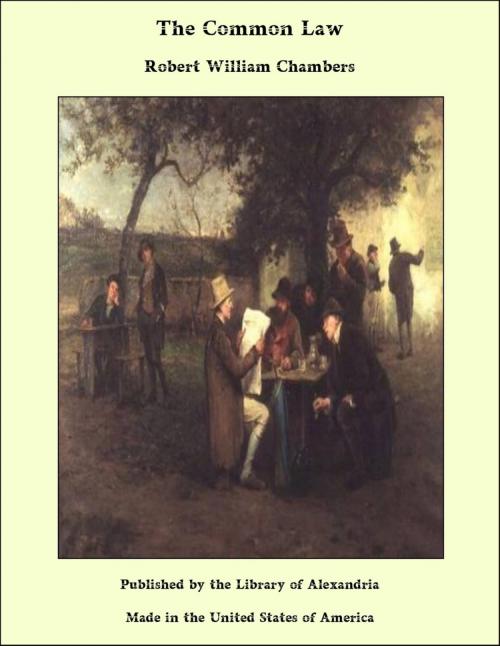| Author: | Robert William Chambers | ISBN: | 9781465608772 |
| Publisher: | Library of Alexandria | Publication: | March 8, 2015 |
| Imprint: | Language: | English |
| Author: | Robert William Chambers |
| ISBN: | 9781465608772 |
| Publisher: | Library of Alexandria |
| Publication: | March 8, 2015 |
| Imprint: | |
| Language: | English |
Neville had begun to see less and less of Valerie West. When she first returned from the country in September she had come to the studio and had given him three or four mornings on the portrait which he had begun during the previous summer. But the painting of it involved him in difficulties entirely foreign to him—difficulties born of technical timidity of the increasing and inexplicable lack of self-confidence. And deeply worried, he laid it aside, A dull, unreasoning anxiety possessed him. Those who had given him commissions to execute were commencing to importune him for results. He had never before disappointed any client. Valerie could be of very little service to him in the big mural decorations which, almost in despair, he had abruptly started. Here and there, in the imposing compositions designed for the Court House, a female figure, or group of figures, was required, but, in the main, male figures filled the preliminary cartoons—great law-givers and law-defenders of all ages and all lands, in robes and gowns of silks; in armour, in skins, in velvet and ermine—men wearing doublet, jack-coat, pourpoint; men in turban and caftan, men covered with mail of all kinds—armour of leather, of fibre, of lacquer, of quilted silk, of linked steel, Milanaise, iron cuirass; the emblazoned panoply of the Mongol paladins; Timour Melek's greaves of virgin gold; men of all nations and of all ages who fashioned or executed human law, from Moses to Caesar, from Mohammed to Genghis Kahn and the Golden Emperor, from Charlemagne to Napoleon, and down through those who made and upheld the laws in the Western world, beginning with Hiawatha, creator of the Iroquois Confederacy—the Great League. His studio was a confusion of silks, cut velvets, tapestries, embroideries, carpets of the East, lay figures glittering with replicas of priceless armour. Delicate fabrics trailed over chair and floor almost under foot; inlaid and gem-hilted weapons, illuminated missals, glass-cased papyri, gilded zones, filets, girdles, robes of fur, hoods, wallets, helmets, hats, lay piled up, everywhere in methodical disorder. And into and out of the studio passed male models of all statures, all ages, venerable, bearded men, men in their prime, men with the hard-hammered features and thick, sinewy necks of gladiators, men slender and pallid as dreaming scholars, youths that might have worn the gold-red elf-locks and the shoulder cloak of Venice, youth chiselled in a beauty as dark and fierce as David wore when the mailed giant went crashing earthward under the smooth round pebble from his sling. Valerie's turn in this splendid panoply was soon over. Even had she been so inclined there was, of course, no place for her to visit now, no place to sit and watch him among all these men. After hours, once or twice, she came in to tea—to gossip a little with the old-time ease, and barter with him epigram for jest, nonsense for inconsequence. Yet, subtly—after she had gone home—she felt the effort. Either he or she had imperceptibly changed; she knew not which was guilty; but she knew.
Neville had begun to see less and less of Valerie West. When she first returned from the country in September she had come to the studio and had given him three or four mornings on the portrait which he had begun during the previous summer. But the painting of it involved him in difficulties entirely foreign to him—difficulties born of technical timidity of the increasing and inexplicable lack of self-confidence. And deeply worried, he laid it aside, A dull, unreasoning anxiety possessed him. Those who had given him commissions to execute were commencing to importune him for results. He had never before disappointed any client. Valerie could be of very little service to him in the big mural decorations which, almost in despair, he had abruptly started. Here and there, in the imposing compositions designed for the Court House, a female figure, or group of figures, was required, but, in the main, male figures filled the preliminary cartoons—great law-givers and law-defenders of all ages and all lands, in robes and gowns of silks; in armour, in skins, in velvet and ermine—men wearing doublet, jack-coat, pourpoint; men in turban and caftan, men covered with mail of all kinds—armour of leather, of fibre, of lacquer, of quilted silk, of linked steel, Milanaise, iron cuirass; the emblazoned panoply of the Mongol paladins; Timour Melek's greaves of virgin gold; men of all nations and of all ages who fashioned or executed human law, from Moses to Caesar, from Mohammed to Genghis Kahn and the Golden Emperor, from Charlemagne to Napoleon, and down through those who made and upheld the laws in the Western world, beginning with Hiawatha, creator of the Iroquois Confederacy—the Great League. His studio was a confusion of silks, cut velvets, tapestries, embroideries, carpets of the East, lay figures glittering with replicas of priceless armour. Delicate fabrics trailed over chair and floor almost under foot; inlaid and gem-hilted weapons, illuminated missals, glass-cased papyri, gilded zones, filets, girdles, robes of fur, hoods, wallets, helmets, hats, lay piled up, everywhere in methodical disorder. And into and out of the studio passed male models of all statures, all ages, venerable, bearded men, men in their prime, men with the hard-hammered features and thick, sinewy necks of gladiators, men slender and pallid as dreaming scholars, youths that might have worn the gold-red elf-locks and the shoulder cloak of Venice, youth chiselled in a beauty as dark and fierce as David wore when the mailed giant went crashing earthward under the smooth round pebble from his sling. Valerie's turn in this splendid panoply was soon over. Even had she been so inclined there was, of course, no place for her to visit now, no place to sit and watch him among all these men. After hours, once or twice, she came in to tea—to gossip a little with the old-time ease, and barter with him epigram for jest, nonsense for inconsequence. Yet, subtly—after she had gone home—she felt the effort. Either he or she had imperceptibly changed; she knew not which was guilty; but she knew.















